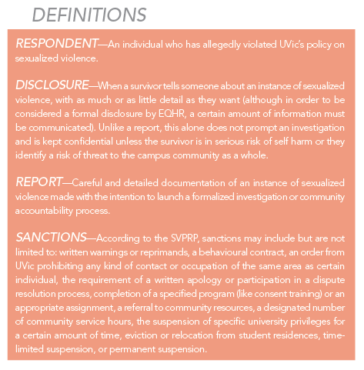Over the past year, some students feel the implementation of UVic’s Sexualized Violence Policy has left them without confidentiality, support, and protection
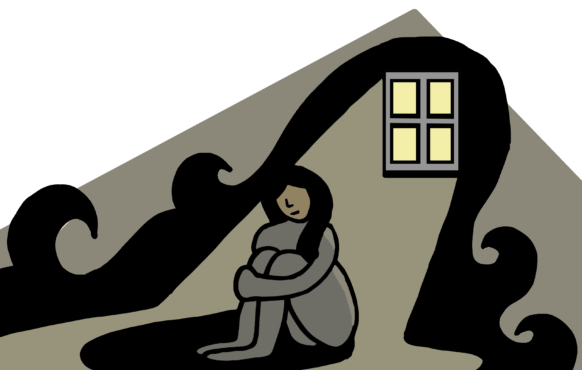
Three weeks into her first year at UVic, Alex* had her consent and autonomy disregarded when she was sexually assaulted. But in the months that followed, it was UVic that continually violated her consent and confidentiality as she tried to access resources for support.
“What I needed at that time was trauma support and mental health support, but every time I reached out, everything was just made worse by the way different parts of the university reacted,” said Alex, a second year UVic student.
Alex’s experience is one of several that highlight the gaps and inconsistencies that have occurred over the last year during the implementation of UVic’s Sexualized Violence Prevention and Response Policy (SVPRP). This policy was first adopted in May of 2017 in accordance with a 2016 provincial law mandating that universities create specific policies to address sexualized violence.
Under UVic’s policy, they created a Sexualized Violence Education and Prevention Coordinator position within UVic’s office of Equity and Human Rights (EQHR). Leah Shumka has held this position since it was created, and one of her main responsibilities has been partnering with other UVic offices to oversee the implementation of the policy. Shumka has also created workshops to educate people on campus, mostly faculty and staff, about the policy and the definition of consent.
Another key aspect of the policy mandated the creation of an intake office where people impacted by sexualized violence can disclose and/or report incidences, and find options for support. Despite the creation of this intake office, students like Alex have continued to have difficulty accessing adequate supports.
Struggling for support
According to section 10 of UVic’s SVPRP, anyone impacted by sexualized violence is entitled to receive all information about the options and processes available to them upon disclosure. However, adherence to this section of the policy has been inconsistent across campus since the policy’s implementation.
“I was three weeks into university and 17 [years old], I didn’t know that there was a specific university [intake office] because no one ever explained it to me,” said Alex. When she first told her Residence (Res) Life Community Leader (CL) about the assault early in the fall semester of 2017, they told her she could report it — which Alex assumed meant talking to the police, something she did not want to do.
It wasn’t until about five months later, in March of 2018, that Alex learned from a source outside of Res Life about the options available to her through the sexualized violence intake office. By that time, she felt it wasn’t worth going through the whole process after so much time had passed.
Due to the trauma of what Alex experienced, she said her memory is distorted in certain places around the assault. She finds it hard to believe that the sexualized violence intake office wasn’t mentioned even once by the Res Life staff, but she can’t remember them ever bringing it up.
In times of intense fear and stress, the brain becomes flooded with hormones which alter how different areas function. For a person who experiences sexualized violence or assault, their ability to retain memories around what happened to them can be disrupted or impaired.
One of the resources her CL recommended was the Victoria Sexual Assault Centre (VSAC), but Alex was concerned that her parents would be contacted if she reached out since she was under 18 at the time of the assault. VSAC offers resources to any individual 13 and over, but Alex said that the university employees she was in contact with weren’t able to let her know in time if she could access the clinic confidentially.
The Anti-Violence Project — a student run organization that offers support and resources for people impacted by sexualized violence — was also not an option for Alex; she had a friend who volunteered there and was nervous they would find out about what had happened.
Alex wished she had been given more Indigenous support resources.
Counseling was where Alex expressed that she found the most support at UVic, but she still feels that her experience with the two counselors she saw was insufficient.
Alex stopped seeing the first counsellor she went to because she felt the deep breathing exercises prescribed by the counselor were unhelpful in coping with her mental health difficulties. She also felt uncomfortable with the strong language that was used by the counselor to describe her experience.
Alex felt far more comfortable with her second counselor who, like her, identifies as Indigenous. But after several sessions, one of her appointments was unexpectedly cancelled, and Alex never heard back from her counselor or the office again despite her attempts to follow up.
“It didn’t make sense to me, because I know I’m not the only one who was seeing her,” said Alex. “I don’t know if other people who were seeing her heard anything and I just slipped through the cracks, but after really being open, there was no follow up after she had to leave.”
Months later, she found out from EQHR that her counselor had gone on leave. Alex never went to another counselor, because there were no other Indigenous women in UVic counseling services and she didn’t want to explain everything to another counsellor all over again.
Alex wished she had been given more Indigenous support resources, particularly since she chose UVic partially because of its reputation for supporting its Indigenous students.
Riley*, a former CL, said that it can be difficult for CLs supporting survivors to access resources like counselling services themselves. Because Riley lived, worked, and studied on campus, they felt unsafe not knowing whether their coworkers and supervisors would find out about where they were going or what they said.
“If both of the people involved are living on campus, they still have to live with each other and see each other and it’s really traumatizing.”
However, options for support can be even trickier to obtain for those who do not fall under the policy’s jurisdiction to investigate — which is anything that occurs off of university property, outside of a UVic event or activity, or when the respondent doesn’t have any power or influence over the survivor’s status at UVic.
Which is how Summer*, a former student, was unable to access resources typically available to survivors in her time at UVic, following her experience with sexual assault in the fall of 2017.
“Technically, the incident didn’t happen on campus, it was off campus,” said Quinn*, a second year student and close friend of Summer who helped to support her after the assault. “There wasn’t anything [UVic] could do, even though both students involved were living on campus.”
In the days following the assault, Quinn and a few of Summer’s other friends met with Shumka on Summer’s behalf. Quinn says Shumka explained the policy and all the options typically available to survivors, but then told the group that in Summer’s particular situation there wasn’t much UVic could do to help.
Summer, Quinn, and some of their other friends went to counselling, and academic concessions to mitigate the pressures of schoolwork were made available to them.
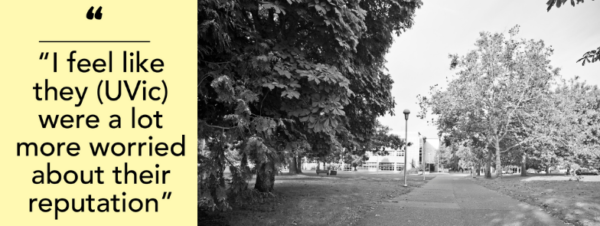
“Our CLs were super helpful, like we weren’t dealing with it alone and that was good, but I feel like the adults that were in charge, even the counselors, didn’t do much,” Quinn said.
Around three months after the assault, Summer dropped out of UVic.
“She missed a lot of school,” said Quinn. “I think in the end she just figured she didn’t want to be there and it wasn’t worth it.”
Summer believes that UVic handled her situation well, and looking back Quinn agrees that they were probably doing the best they could. At the time, though, Quinn felt really angry and emotional.
“I feel like they (UVic) were a lot more worried about their reputation with it,” said Quinn. “They wanted us to feel safe and obviously that’s important, but I feel like there’s definitely a lot of, just trying to cover their asses.”
Although Quinn understands the limits on UVic’s abilities to investigate incidents of sexualized violence, she said that the policy needs to be more inclusive for students living on campus who she considers to be the university’s responsibility.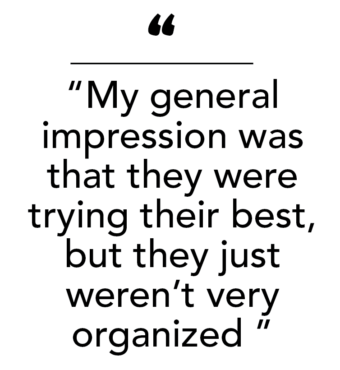
“If both of the people involved are living on campus, they still have to live with each other and see each other and it’s really traumatizing,” Quinn said.
Summer would frequently run into the student who assaulted her around campus and in the cafeteria, to the point where she stopped leaving her dorm room.
“They gave us the resources they could, but it just felt like it wasn’t enough,” Quinn said. “Obviously, this had a really big effect on her, and I just feel like they didn’t do enough.”
In cases where UVic has no jurisdiction to investigate under the parameters of the Sexualized Violence Prevention and Response Policy, Shumka said they cannot impose sanctions or expel someone from campus. However, according to Shumka, there may be other policies that can be used to address incidents, including the Non-Academic Misconduct policy or the Response to At-Risk Behaviour policy.
“[It’s] that balance of being survivor-centred and trauma-informed, but also fair and transparent and procedurally fair,” Shumka said. “There’s going to be things that fall through, and we’ve done our best to close up all of those gaps, in part through a heavy emphasis on support.”
Summer was not the only person who had to come face to face with the person who assaulted her— Alex also encountered similar issues with seeing the person who assaulted her around campus, as he too lived in residence.
“My biggest problem was seeing him around on campus,” said Alex. One day, she was sitting in the cafeteria when he sat right down beside her and started a conversation.
Despite talking to Res Life about this, Alex said she was never informed of any options or procedures through the university that could help her. Her CL told her that he would not be able to enter their residence building, although Alex said that it wasn’t inside her building that she’d encountered issues.
“My general impression was that they were trying their best, but they just weren’t very organized about it,” said Quinn, speaking about Summer’s situation. “They didn’t have a lot they could do about it, there wasn’t a lot of thought put into it, so things just kind of fell through the cracks.”
Res Life’s response
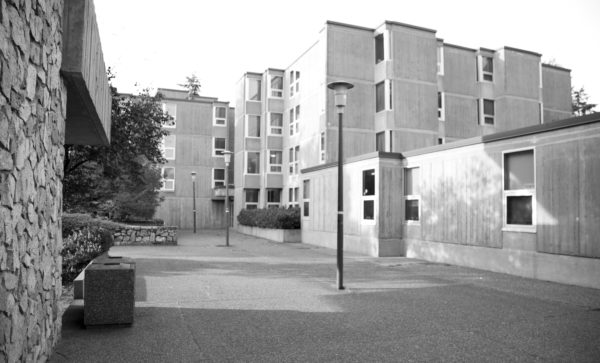
Residence is one of the key areas on campus where disclosures are received, according to Shumka. If a member of the Res Life staff is disclosed to, they are supposed to follow Res Life protocol which involves alerting Shumka’s office as soon as possible and, with the survivor’s permission, put them in contact with her.
“What we’re trying to move towards is this being the centralized office so that the information is consistent, the advice is consistent, that people aren’t ping-ponged around, that they’re not telling their story over and over again,” said Shumka. “That’s how it’s supposed to work now, but it’s taken a while just to get to that place.”
Indeed, this has not always been the case during the policy’s implementation. Alex didn’t even know about the intake office for months despite her assault occurring several months into the implementation of the SVPRP.
“In a perfect world I would have been referred to the sexualized violence intake office right after it happened and we would have gone from there,” said Alex. “But that’s not what happened. Res Life totally just butchered everything.”
Every time Alex would confide in her CL about what happened to her or the struggle with mental health she experienced in the months following the assault, the next day she would receive emails and phone calls from UVic employees whom she had never met.
“Information would get passed along in a way that was never clearly explained to me, and in a way that seemed kind of like whatever I said got passed along to whoever,” said Alex. “Even after people were like, ‘Everything from now on will be your choice.’”
The employees who contacted Alex all seemed to already know what was going on, despite the fact that she had never even given consent for her contact information to be shared, let alone what had happened to her.
“It seemed like everyone knew about everything,” said Alex. “I didn’t get the chance to tell my own story.”
According to section 11.4 of the policy, members of the university community must receive consent from the person who disclosed to them before sharing any information about that person unless there is an imminent risk of harm to someone or the disclosure involves workplace harassment.
Section 17.5 states that if the university has to disclose confidential information, survivors and those impacted by sexualized violence will be told the extent of the information revealed, and can choose to be supported throughout this process.
The only person Alex ever granted consent to share her information was one of her counselors. The counselor told Alex she needed permission to speak to Res Life regarding how Alex was upset about the lack of confidentiality.
“Other than that, my information was just being shared without my consent, without my knowledge, without any explanation of what would need to be shared,” Alex said.
Several times, Alex told her CL she didn’t want to be contacted by Res Life about her situation, but there was nothing the CL could do.
“She was like ‘it sucks, I’m sorry,’” said Alex. “I didn’t feel like I had a choice with how I was engaging with Res Life, I felt like they were calling all the shots.”
Often, the emails from UVic employees would request meetings with Alex. Though she attended a few of these meetings, she did not find them productive and stopped accepting the requests.
“The tone that I got in any sort of interaction, which is really sad, was that I was a nuisance and they didn’t like me,” Alex said of Res Life. “They were never compassionate.”
One such email appeared in her inbox after Alex had discussed some of the more serious mental health problems she was experiencing with her CL one night. In the email, the employee told her that it was important they “discuss concerns related to your well being and your stay in residences.”
This message came during the exam period in December 2017, Alex’s lowest point after the assault, when she said she was having severe mental health problems. Unsure of what that proposed discussion would entail, Alex thought she was about to get kicked out of residence and would have to find a new place to live; this added pressure made everything much worse.
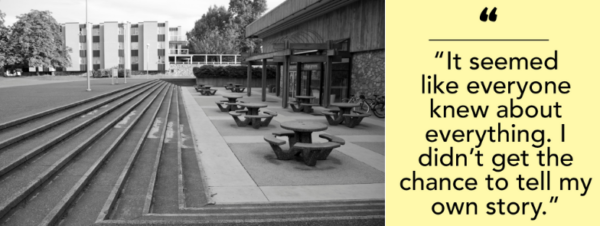
She did not respond to the email and instead went home between her exams out of concern for her mental health. Alex found it strange that she was never contacted about the meeting again.
While she was away, several Campus Security and Res Life officials showed up to Alex’s dorm room, which she didn’t find out about until friends told her months later. Although Alex had already told her CL she wasn’t going to be on campus, her friends said that the university officials pounded on her door and declared that they would let themselves in if she didn’t answer.
Res Life left a note on Alex’s door, according to her friends, but it was gone by the time she came back. She never found out what the note said or who took it, but said she was embarrassed to discover that everyone but her knew something had happened.
When she asked her CL why this had happened, in spite of her having told them that she was going home, the CL explained that it was just a mix-up.
“That’s not just a mix up, that’s humiliating,” Alex said.
When asked about the policies and procedures around how Res Life handles disclosures of sexualized violence, UVic Director of Residence Services Kathryn MacLeod declined to comment. Res Life was also given the opportunity to address the allegations that they did not uphold confidentiality and proper procedures for supporting survivors through the policy, but again declined to comment.
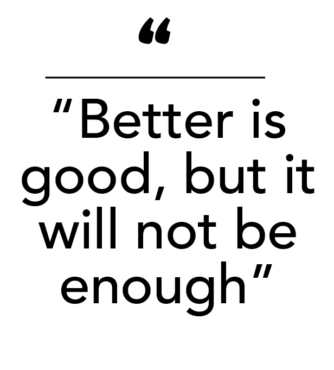 In the years before the implementation of the policy, Riley says CLs were instructed during their training to ask for a resident’s consent at every step when handling disclosures of sexualized violence. Riley says that they were also instructed to tell the resident that they were going to reach out to the Residence Life Coordinator (RLC) in the interest of providing support.
In the years before the implementation of the policy, Riley says CLs were instructed during their training to ask for a resident’s consent at every step when handling disclosures of sexualized violence. Riley says that they were also instructed to tell the resident that they were going to reach out to the Residence Life Coordinator (RLC) in the interest of providing support.
However, Riley noted two crucial problems with this system: first, the investigation process was not transparent and felt insufficient for survivors they worked with; and second, the story students told to their CL would be passed on immediately to the RLC — and sometimes additional people at UVic — whether the student had given permission or not.
“It was cautious, but it was not consent,” Riley said in regards to Res Life’s procedures prior to the implementation of the policy. “We were to tell the RLC nonetheless, and from there it was out of our hands.”
Last year, following the start of the policy’s implementation, Riley said that CLs received training on the policy and resources they could offer survivors, such as the intake office. For Riley, the new system was helpful, but it seemed to primarily impact how sexualized violence was handled by people above them and didn’t change how CLs responded very much from previous years.
During their time supporting people who had experienced sexualized violence after the implementation of the policy, Riley said that they felt UVic did not respond adequately, across multiple university offices. Resources such as counselling services shouldn’t be able to see personal information about a student in a referral, Riley said, as students should be allowed to share that when they are ready.
This sharing of personal information through referrals is something Alex said she experienced on the first day she met her second counselor.
“Her exact words when I first met her were ‘I was under the impression a specific incident had occurred,’ which meant Res Life had told her, as I had been referred to her by Res Life,” said Alex.
During their time as a CL, Riley witnessed a lack of follow up with those affected by sexualized violence, in addition to disconnected and unclear sharing of personal information between different UVic offices.
Riley expressed regret for their involvement in this process, even though they had been following the procedures laid out by UVic at the time.
“I’m not without fault,” said Riley. “When I first received that disclosure I acted as the institution had instructed me to, even though it caused harm.”
Fixing the Cracks
By the time Alex stepped into Shumka’s office in March of 2018, she wasn’t interested in reporting the assault.
“If I had known at the time [it happened] that I could report to the office and get a response that way, then I would have, but to me it’s not worth it now almost a year later to go through the whole process,” said Alex. “The thing that I needed for my healing is for that response to be looked at, especially for other girls who are going to go through it.”
This isn’t an issue that comes down to any one individual or office, Riley points out.
“Although the university and Res Life’s response to this issue has been systemically bad and caused a lot of harm, there are individuals within it that had the best intentions — a network of fellow survivors and allies who understood,” said Riley. “I can’t fully say ‘Res Life sucks at this’ because there are people within Res Life who have tried their hardest to reduce harm within the existing institutional structures (which I believe is the most harmful part of this).”
On top of that, significant amounts of work and advocacy went into creating and implementing the policy, and these efforts shouldn’t go unrecognised — particularly the work of the 21-person working group that played a crucial role in creating the policy over the course of a year.
“There are dozens and dozens of people who worked very hard for it, and it pains me (and them, I’m sure) that this policy [did] not help people to the extent that it should have,” said Riley.
Although Shumka has not been alone in the implementation process, she has been at the heart of all the progress made by the policy over the last year.
“Leah Shumka can only do so much in a particular day, both as the intake person and as the education person, so I think that the policy or EQHR as the home of the policy probably could use some more resources to move this forward,” said Annalee Lepp, a UVic professor who received a President’s Extraordinary Service Award for her role as chair of the policy’s working group. “It’s not something that happens overnight.”
Currently, EQHR has hired a third party to conduct a review of the policy, something that was promised at its creation. Although this was initially expected to take place in May, Shumka said it has taken a few extra months due to summer schedules.
The review will identify strengths that EQHR, alongside other offices around campus, should build on in the future, and any areas of weakness that they should collectively improve upon.
“There’s a lot of competing factors that we have to keep into consideration,” Shumka said. “The way policies like ours are going to work and that people are going to have faith in them and adhere to them is if they are survivor-centered and trauma-informed but they’re also fair and transparent and procedurally fair, because if people felt like they were accused of something and there was no fair process and all of a sudden they were kicked off campus, we would undermine faith in the policy and its approach.”
When given the opportunity to address the allegations that UVic did not uphold confidentiality and proper procedures for supporting survivors through the policy, Shumka affirmed that EQHR — and the university more broadly — is 100 per cent committed and invested in creating survivor-centred and trauma-informed processes.
“Creating the procedures to meaningfully bring a brand new policy to life and to implement the policy within a complex organization is a complex task that takes some time,” said Shumka. “I believe that a lot of important change has happened on campus, in particular since May 2018 [one year after implementation of the policy], and we are moving strongly and positively in the right direction.”
As UVic continues to adapt and evolve in accordance with the policy, it is important to remain conscious of the experiences of those who have been impacted by sexualized violence to prevent future harm.
“The policy is improvement upon no policy,” said Riley. “Better is good, but it will not be enough. We need to keep working on this, and to keep reflecting on the feedback from brave survivors whose stories were not adequately protected.”
*Names and some identifying details have been changed to protect the privacy of individuals.
